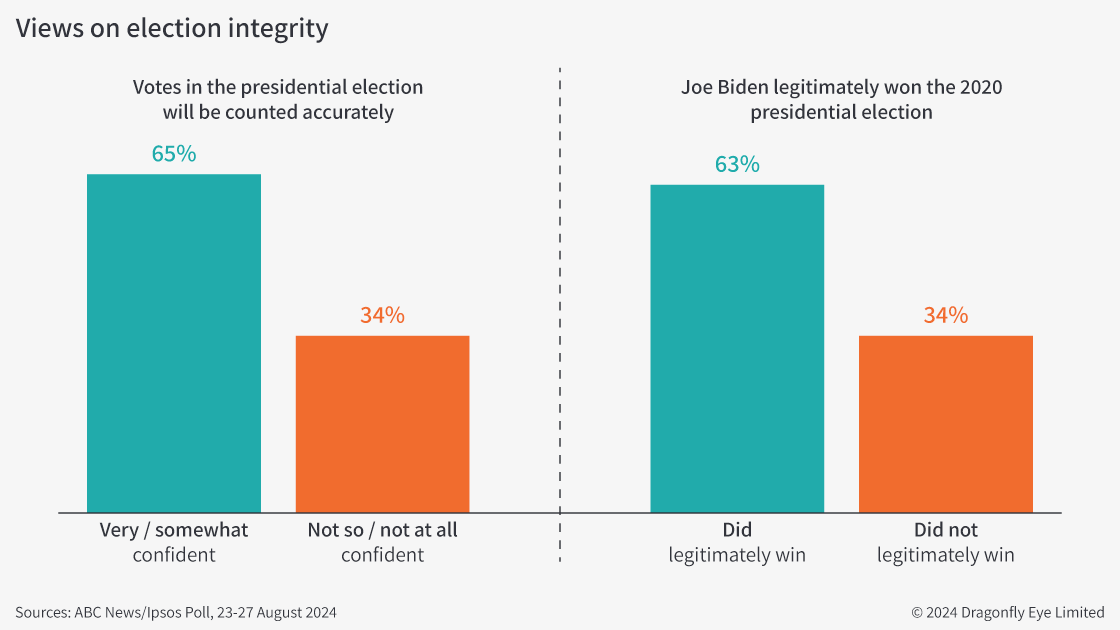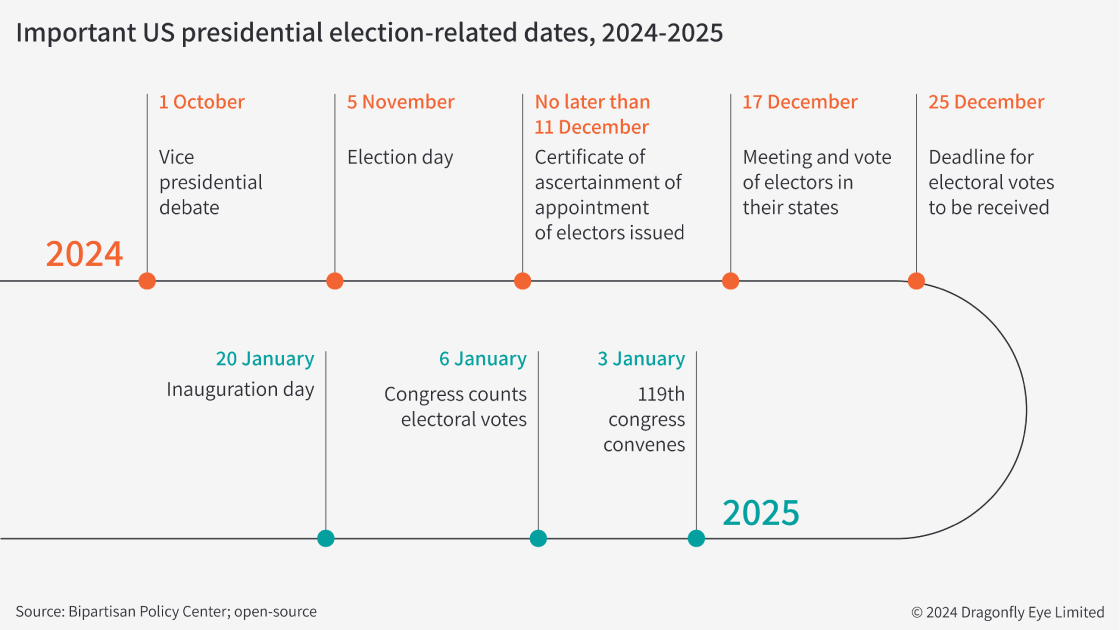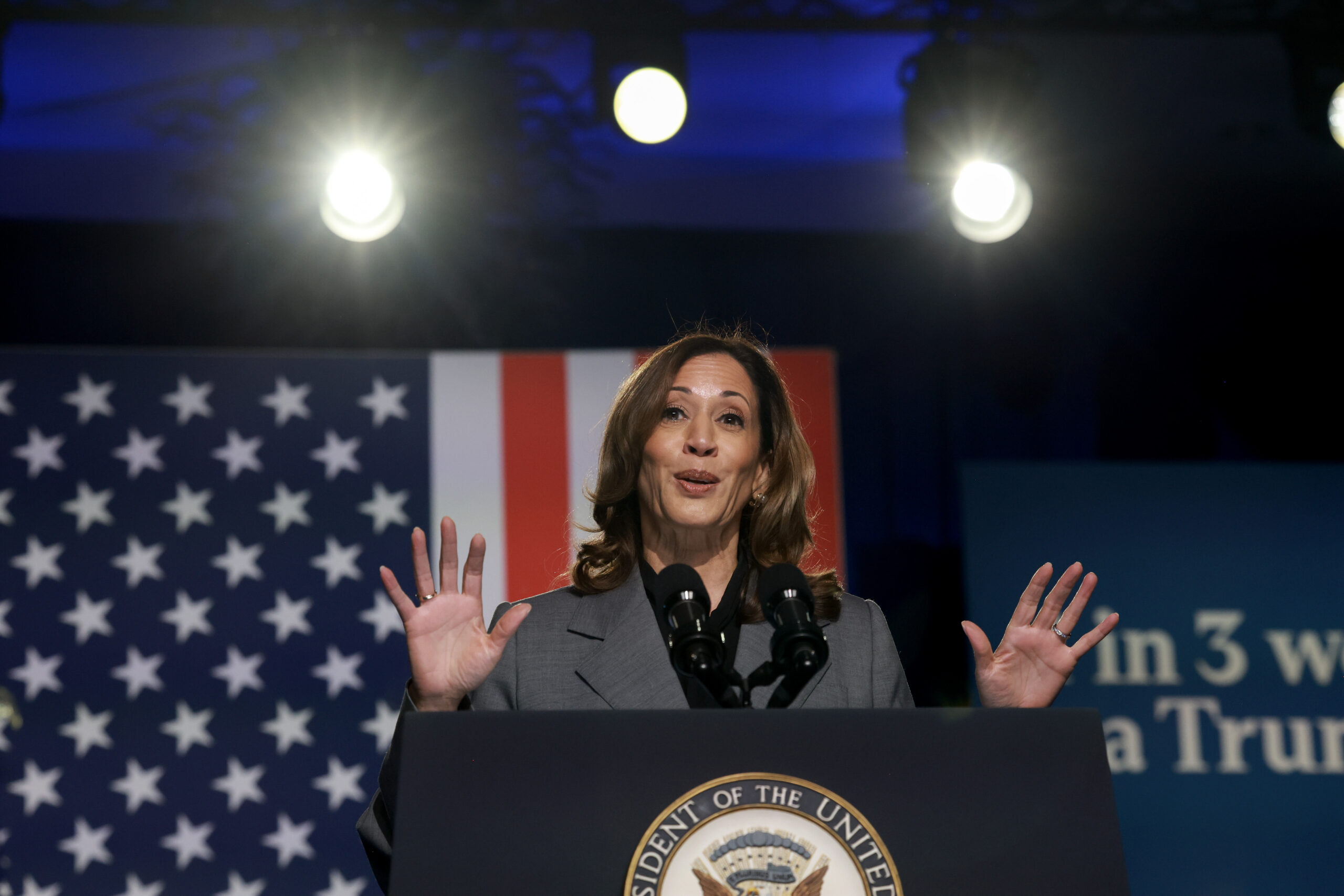If media projections indicate that Kamala Harris will win the presidential election on 5 November or the days immediately after, this would very likely prompt peaceful and sporadic protests by Trump supporters
This assessment was issued to clients of Dragonfly’s Security Intelligence & Analysis Service (SIAS) on 12 September 2024.
- The latest national polling data suggests that Harris currently holds a slight lead over Donald Trump nationally
- If Trump legally challenges a Harris victory, near-weekly protests in support of these efforts are likely to occur, particularly in swing states
There are signs that Donald Trump and some of his supporters would not accept Kamala Harris winning the 5 November presidential election. Trump has questioned the integrity of the electoral process several times in recent months. These doubts seem to have become more prominent since July, during which Harris has overtaken him in many national (and some swing state) polls. Recent polling suggests that a sizable proportion of Trump supporters share his concerns about the fairness of the upcoming election.
This report sets out what we assess would be the most likely security implication of a Harris victory; several weeks of largely peaceful protests by Trump supporters after the result is announced. These would most likely occur in swing states, such as Arizona, Georgia, Michigan, Nevada, North Carolina, Pennsylvania, and Wisconsin, where Harris wins. If protests after the 2020 election are anything to go by, widespread or coordinated unrest would be unlikely.
A major political or security crisis, such as a successful attempt to overturn the election result or disrupt the electoral process (such as occurred on 6 January 2021) is unlikely.
Trump seemingly preparing to legally challenge election results
Trump appears likely to reject and contest the results of the upcoming election if he loses. At public events since May, he has said that he would only accept the election results if ‘everything’s honest’. And during a campaign rally in June he said ‘the only way they [Democrats] can beat us is to cheat’. Trump seems to be laying the groundwork to declare the election as being illegitimate if he loses. This rhetoric has become more common since Harris has overtaken him in some national polls (Trump had led President Biden before the latter exited the race, but Harris now leads Trump by three percentage points). Trump has since described the change of Democratic candidate as a ‘coup’.
Trump’s doubts about the electoral system appear to resonate with some voters. According to an ABC News/Ipsos Poll published on 30 August, half of Republican respondents said they lack confidence that votes in the upcoming election will be counted accurately, and 30% of those respondents said Joe Biden was legitimately elected. These findings suggest that a significant proportion of the electorate would back Trump challenging the result.

Trump contesting a Harris victory would almost certainly centre on litigation. This would involve legally challenging vote counts and seeking recounts, particularly in any states he loses by a tight margin. According to a 2022 Congressional Research Service report about this, federal election results are never official until after election day when state jurisdictions have canvassed ballots and certified results. The same source suggests this can take between days and several weeks. The Republican party seems to be preparing for this scenario; it rehired a political operative in June who played a central role in trying to contest the 2020 election results.
Legal experts cited in mainstream US press outlets suggest that any such challenges would be unlikely to succeed. The basis for this is that lawsuits alleging election fraud in 2020 failed due to a lack of sufficient evidence. We broadly agree, given that confirmed cases of election irregularities have long been very uncommon, and there is little discernible evidence that the US electoral system is more vulnerable to manipulation than previously. Still, any type of formal challenge to the results would almost certainly lead to at least several weeks of uncertainty about the outcome.
Harris victory trigger for large protests
Projections on the night of election day and the days immediately after a potential Harris victory would probably lead to peaceful protests by several tens of thousands of Trump supporters across the country. This would be particularly likely in swing states where the result has previously been decided by a few thousand votes or less. Current indications suggest any post-election protests would be largely spontaneous; similar to the 2020 election.

We have not seen a campaign like ‘Stop the Steal’ emerge yet. The movement was central to mobilising protests against the election results in weeks and months after the 2020 vote. Press reports suggest that right-wing political operatives formed and led the group in the immediate aftermath of the election. Trump used ‘stop the steal’ as a slogan during rallies, but he does not seem to have been involved in organising or leading the movement. It was largely disbanded after January 2021. Nevertheless, if Harris is declared the unofficial winner by media outlets in the days immediately after the election, we would anticipate a coordinated activist movement to reject the election begin to take shape online.
Several tens of thousands of people countrywide would very likely protest against a Harris victory in the days after the unofficial results are announced. Based on ‘stop the steal’ protests in the days after the 2020 presidential election, these would most likely occur near state capitol buildings in California, Florida, Pennsylvania, and Texas as well as in any swing states where Harris wins by a very slim margin. The latest polls suggest this would include Arizona, Georgia, Nevada, North Carolina and Pennsylvania.
After the 2020 election, Trump used the ‘stop the steal’ slogan to galvanise his supporters to back his efforts to contest the election results. As was the case then, the main trigger for protests to grow larger in this scenario would be if Trump calls on his supporters to protest and reject the results. Based on precedent from 2020, we would not anticipate major incidents of violence at these gatherings.
Protest activity likely to continue during transition period
In the scenario that Trump’s team legally challenges the election result, we anticipate that localised protests would occur at least weekly. This is based on patterns after the 2020 election. And the largest of these would probably consist of a few hundred people demonstrating at state government buildings such as city halls, capitol buildings, and governor’s residences. We assess that most of these gatherings would probably be peaceful; according to data from our partner the Armed Conflict Location & Event Data (ACLED) project, sporadic incidents of violence during ‘stop the steal’ rallies between November 2020 and January 2021 consisted of physical fights.
Small groups of right-wing extremists would probably attend such protests. We suspect that these actors would mainly portray themselves as securing the events in case of any counter-protests and scuffles between rival activists. Local press reports suggest that this dynamic played out on several occasions in 2020 during ‘stop the steal’ demonstrations. In any case, we doubt that right-wing extremists would attend rallies in large numbers and act violently, given that there would almost certainly be a sizable police presence.
In our view, 6 January 2025 would almost certainly be a flashpoint for widespread protests. This is when Congress is scheduled to certify the election result. During the certification of the election results on 6 January 2021, there were 40 ‘stop the steal’ protests across 26 different states, primarily in state capitals, based on ACLED data (see infographic). Although most protests were peaceful, several thousand people violently stormed the US Capitol in Washington DC in a failed effort to prevent Congress from certifying the results.
We assess that a similar coordinated effort of that scale is unlikely this election cycle. There are two reasons for this: first, extremist groups seem focused on local-level activity, rather than coordinated national campaigns, according to non-profit reports on domestic extremist activity in recent years; second, state and federal authorities will probably be at a very high state of alert to prevent any major incidents of violence.
Image: Democratic presidential nominee, U.S. Vice President Kamala Harris, speaks during an event at the Cobb Energy Performing Arts Centre on 20 September 2024, in Atlanta, Georgia. Photo by Joe Raedle/Getty Images.




